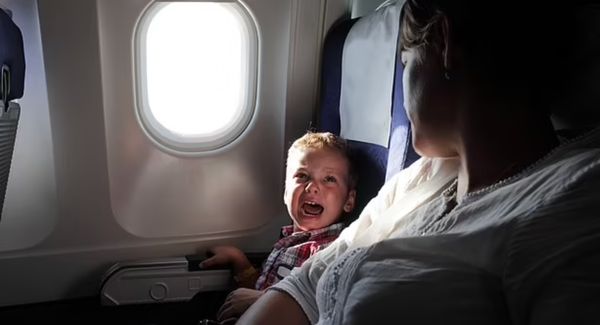In a recent incident aboard a cross-country flight, a 34-year-old woman found herself at the center of controversy for her refusal to relinquish her second airplane seat to accommodate a fussy toddler. While the situation sparked heated debate among passengers and garnered attention on social media platforms, the woman staunchly defended her decision, insisting that she had done nothing wrong. This incident, characterized by contrasting perspectives on comfort, personal space, and compassion, unfolded against the backdrop of holiday travel.

A Decision for Comfort
The woman, who identified herself as obese, had originally booked two seats for her flight due to past experiences of discomfort when attempting to fit into a single seat. Her intention was to ensure a more comfortable journey, and she believed she was well within her rights to do so. With the holiday season fast approaching, she eagerly looked forward to visiting her family for Christmas, anticipating a joyous reunion.
Balancing Personal Rights and Compassion
However, her excitement quickly gave way to frustration when a young mother approached her, imploring her to “squeeze into one seat” so that her restless 18-month-old son could occupy the other. The woman was confronted with a dilemma: on the one hand, she had secured her second seat to alleviate the discomfort associated with her size, and on the other hand, she empathized with the young mother’s struggle to manage her squirmy toddler during the flight.
In the wake of the incident, the woman turned to Reddit to share her perspective. She candidly acknowledged her obesity, stating, “I am obese. I’m actively working toward losing weight and I’ve made progress – but I booked an extra seat because I’m fat.” Her decision to maintain her second seat stemmed from the fact that she had paid for it, and she believed that she was entitled to the additional space she had purchased. She explained that she displayed her boarding passes to prove that she had indeed paid for both seats, but this action only served to escalate the situation.
Conflicting Views and Airline Policies
The mother, adamant that her son needed the extra seat, took her concerns to the flight attendant, accusing the woman of “stealing” the seat from her child. This complaint created tension and discomfort not only for the parties involved but also for the fellow passengers who witnessed the escalating dispute. The flight attendant, caught between the two conflicting claims, attempted to mediate the situation by suggesting that the woman try to “squeeze in” but to no avail. The woman held her ground, firmly asserting her right to the seat she had purchased.
The heart of the matter lay in the fact that, according to airline regulations, children under a certain age—typically 2 years old or younger—do not require a separate seat and can instead sit on their parent’s lap during the flight. This policy is designed to accommodate families and reduce travel costs for parents with infants. However, it also hinges on the expectation that there will be available seating for such arrangements. In this instance, the mother seemed to be hoping for the luxury of an extra seat to ease the challenges of managing her young child, thereby avoiding the need to purchase an additional ticket.
Perspectives and Moral Dilemmas
Throughout the flight, the atmosphere remained tense. The woman recounted that she received disapproving glances and passive-aggressive remarks from the mother, further exacerbating her discomfort. Despite the challenging circumstances, she couldn’t help but feel some sympathy for the mother, who was clearly struggling to control her restless child. Still, the woman questioned whether she was truly in the wrong for upholding her right to the extra seat she had paid for.
As news of the incident spread, it garnered widespread attention and ignited passionate discussions on social media. Many individuals expressed their opinions, condemning both the mother and the flight attendant for their perceived insensitivity and behavior. One commenter on the matter remarked, “[The mother] is an a**hole for not buying a seat for her son and assuming someone else would give up a seat they paid for. Odds are she was hoping there’d be extra seats on the flight so she didn’t have to pay and used the lap thing as a loophole.”
Finding a Balance
The incident underscored the complexities surrounding issues of personal space, comfort, and empathy during air travel. It also raised questions about airline policies, particularly regarding seating arrangements for young children, and whether they adequately address the needs and expectations of passengers. In a world where airline travel can often be stressful and fraught with challenges, finding a balance between individual rights and collective compassion remains an ongoing debate.
In the end, this incident serves as a poignant reminder of the multifaceted nature of human interactions, especially in confined spaces like airplanes, where diverse perspectives and interests collide. While the woman’s refusal to give up her extra seat was rooted in her quest for comfort, the young mother’s desperation for some respite underscored the universal challenges of traveling with young children. Ultimately, the incident left passengers and onlookers grappling with a complex moral dilemma: when personal rights clash with compassion, how do we navigate the delicate balance between self-preservation and understanding the struggles of others?
